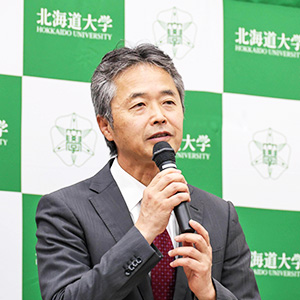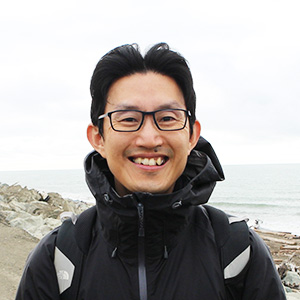The ocean provides many ecosystem services, including food, climate regulation, and economic benefits, and has fostered diverse cultures throughout history. However, it is rapidly changing due to human activities. Concerns about rising temperatures, marine environmental degradation, declining biodiversity, and declining fishery resources are increasing. Elucidating the changes occurring in the ocean due to human activities and understanding how these changes will impact human society are essential to build a sustainable society.
Focusing on diverse research fields including ocean physics, marine biology, and marine chemistry, our laboratory promotes research that contributes to a comprehensive understanding and conservation of the ocean. In addition, through education centered on field training and international exchange, we aim to cultivate the human resources needed to realize a sustainable society.
In regard to the recent rapid progress of global warming, we elucidate the actual situation and mechanisms of changes in ocean heat and material circulation, and the impact of changes in the marine environment on marine ecosystems and biodiversity. We also promote research that understands the global environment from the perspective of oceanography and connects the knowledge gained to the preservation of marine ecosystems.
We offer unique fieldwork such as on-board training on the training ship Oshoro Maru, coastal environment training, and sea ice training on Lake Saroma using the Faculty of Fisheries at Hokkaido University. These provide education that allows students to understand the marine environment through real-life experiences and acquire oceanography and fisheries oceanography as practical studies.
By collaborating with the Uehiro Center for Advancement of Oceanography, School of Ocean and Earth Science and Technology , University of Hawaiʻi at Mānoa through fieldwork training and symposiums, Hokkaido University will provide education that foster a global perspective that covers not only the polar and subarctic regions, which are Hokkaido University’s specialty, but also the tropics and subtropics. We also aim to nurture human resources who can contribute to the development of the international community.

In recent years, the rise in greenhouse gas emissions has accelerated global warming, leading to record-breaking heatwaves each summer and devastating heavy rains that disrupt daily life across the country. These rapid environmental changes not only pose serious threats to human society but also alter habitats, reduce wildlife populations, and jeopardize the stability of ecosystems worldwide.
Amid these challenges, the ocean—which covers approximately 71% of the Earth’s surface—plays a crucial role in mitigating global warming by absorbing heat and carbon dioxide. It also serves as a vital habitat for countless species, contributing to biodiversity and ecological balance. Deepening our understanding of the ocean and recognizing its critical role is essential for protecting the global environment and fostering a sustainable and prosperous future for humanity.
It is with great pleasure that we announce the establishment of the Uehiro Laboratory for Oceanography within the Division of Marine Bioresource and Environmental Science at the Faculty of Fisheries Sciences, Hokkaido University. Made possible through the generous support of the Uehiro Foundation on Ethics and Education, this laboratory will focus on advancing research in marine conservation, particularly in polar and subarctic regions—areas where the effects of global warming are becoming increasingly evident. Our work will include extensive field studies both in Japan and abroad, generating practical insights based on real-world observations. Additionally, we are committed to nurturing the next generation of scientists, equipping them with a global perspective and advanced expertise.
Through these research and educational initiatives in marine science, we strive to contribute to environmental preservation and the restoration of biodiversity. We sincerely appreciate your continued understanding and support in this endeavour.
Akihide KASAI, Chairman

Hokkaido University is committed to promoting sustainability to contribute to the resolution of global issues as HU VISION 2030, the university’s medium-term vision for the creation of a virtuous cycle and ecosystem. The Faculty of Fisheries Sciences is conducting education and research aimed at achieving SDGs Goal 14, “Life below water.” For example, during the on-board training on the Oshoro Maru, we aim to contribute to the conservation of marine biological resources by conducting marine observation in coastal waters near Japan to the Arctic Ocean, capturing changes in ecosystems caused by global warming and the sea ice reduction, and clarifying these mechanisms.
It is a great pleasure to announce that Uehiro Laboratory for Oceanography was established in April 2025, with the generous support of the Uehiro Foundation on Ethics and Education. We will conduct more advanced education and research on oceanography, including various field training on land, on lakes, and at sea, with the goal of understanding and preserving the global environment, collaborating with the Uehiro Center for the Advancement of Oceanography in the Department of Oceanography at the University of Hawaiʻi at Mānoa. Through these education and research activities, we aim to further contribute to the achievement of SDGs Goal 14, “Life below water,” and to develop human resources who can play an active role on the world stage.
Let’s study oceanography in the fields of Hawaii, Hokkaido and on-board to realize a sustainable society with an international perspective.
Hiromichi UENO, Vice Chair
©Copyright ulo.fish.houdai.ac.jp All Right Reserved.